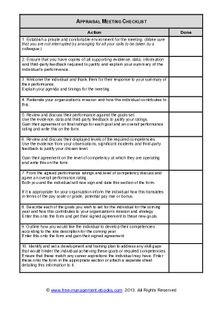Appraisal Meeting Checklist
 PDF
PDF
This Appraisal Meeting checklist outlines the steps you need to take to conduct a successful appraisal meeting with a team member.
This interaction between the manager and the team member is essential for maintaining a positive working relationship and encouraging career development. The team member should feel as though their own opinions have been considered and that the meeting represents a fair, agreed, and unbiased forum for a discussion of their performance during the period.
Reviewing a team member's performance should be the main topic of the meeting and it's success will depend on how well you have prepared, the quality of the data you have collected, and the quality of the review sessions you had throughout the appraisal period. Ensure that you have copies of all supporting evidence, data, information and third-party feedback required to justify and explain your view of the team member's performance.
Download "Appraisal Meeting Checklist.pdf"



 PDF
PDF
 PDF
PDF
 PDF
PDF